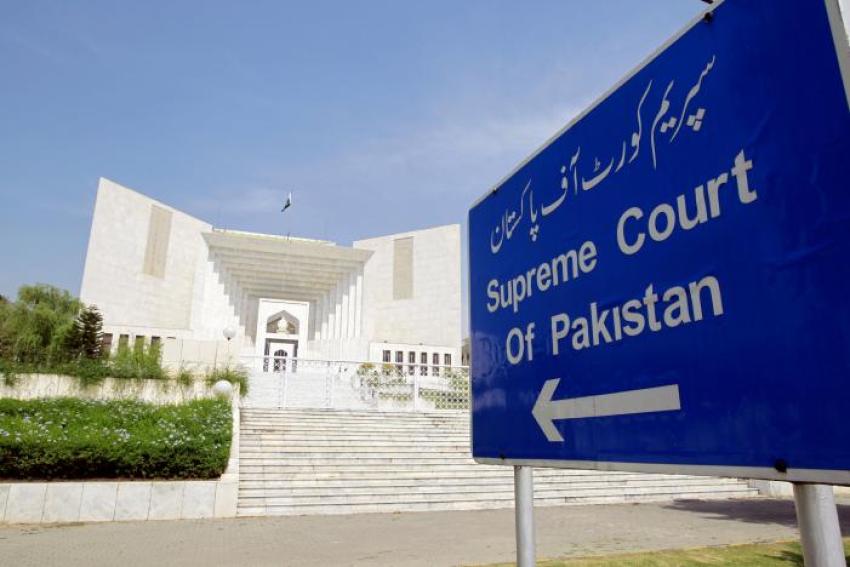Pakistan high court frees man imprisoned 17 years on death row for blasphemy

Pakistan’s highest court on Thursday acquitted a Muslim man who’s been imprisoned for 17 years and sentenced to death after being accused of authoring blasphemous letters.
A three-judge bench on the Pakistan Supreme Court exonerated Wajih-ul-Hassan, his lawyer told AFP.
The lawyer, Nadeem Anthony, added that Hassan is expected to be released in the coming days.
"Everyone was crying with happiness," the lawyer was quoted as saying.
Hassan was accused in 1998 of writing and sending blasphemous letters to a Muslim lawyer. In Pakistan, insulting Islam or its prophet Muhammad is a crime that is punishable by death or life in prison under the majority-Muslim nation’s notorious blasphemy laws.
Hassan was convicted and sentenced to death under section 295-C of Pakistan’s penal code.
According to the Pakistani news outlet Dawn.com, the court ruled that the prosecution had failed to prove beyond a reasonable doubt that the letters at the center of Hassan’s blasphemy allegation were actually written by him.
Rights activists have long condemned Pakistan’s blasphemy laws as they’ve been abused by majority Sunni Muslims to settle personal scores or persecute religious minorities.
Hassan is one of at least 40 prisoners believed to be on death row in Pakistan for the crime of blasphemy, according to the U.S. Commission on International Religious Freedom.
“USCIRF welcomes the #Pakistan Supreme Court’s acquittal of Wajeehul Hassan after almost 20 years on death row on false #blasphemy charges,” reads a tweet from USCIRF. The agency said it's urging the Pakistani government to "free others imprisoned under unjust blasphemy laws and work to repeal them.”
Pakistani human rights activist Shaan Taseer told attendees at the State Department’s ministerial on religious freedom in July that as many as 200 people are being imprisoned on blasphemy charges in Pakistan.
There have been positive signs in the past year, however, as Pakistan’s court system has stepped in to free religious minorities and others unfairly convicted of blasphemy or similar religious crimes.
In October 2018, the Supreme Court acquitted Christian mother Asia Bibi who spent nearly a decade on death row after she was accused of blasphemy. In January, the court upheld its acquittal of Bibi after radical Muslims rioted in the streets, called for the death of the Supreme Court justices, and demanded a review of the decision.
In March, a high court in Punjab released 82-year-old Ahmadi Muslim prisoner of conscience Abdul Shakoor, who had been jailed for three years for selling commentary on the Ahmadiyya Muslim faith in his book store.
Although many have been jailed for blasphemy and even sentenced to death, Pakistan has never executed anyone for blasphemy. However, some blasphemy-accused victims have been killed by Muslim mob violence.
Human rights advocates are keeping up the pressure on Pakistan as dozens continue to languish in prisons because of its blasphemy laws. On Wednesday, Amnesty International called for the release of Junaid Hafeez, a 33-year-old lecturer at Bahauddin Zakariya University in Multan.
According to the human rights watchdog, Hafeez has been in solitary confinement since 2014 after he was charged with making blasphemous Facebook posts.
Amnesty International's regional researcher, Rabia Mehmood, called Hafeez’s case “a travesty.”
“Junaid’s lengthy trial has gravely affected his mental and physical health, endangered him and his family and exemplifies the misuse of Pakistan’s blasphemy laws,” Mehmood said. “The authorities must release him immediately and unconditionally and drop all charges against him.”
Pakistan is recognized by the U.S. State Department as a “country of particular concern” for egregious and systemic violations of religious freedom. At its first two ministerials on religious freedom in 2018 and 2019, the State Department released statements of concern condemning the existence of blasphemy laws.
“Such laws are often used as a pretext to justify vigilantism or mob violence in the name of religion, or as a pretext to pursue retribution related to personal grievances,” the most recent statement of concern released in July. “We see governments using such laws to wrongfully imprison and punish individuals whose views on matters of religion or belief may differ from official narratives or the views of majority populations.”
Follow Samuel Smith on Twitter: @IamSamSmith
or Facebook: SamuelSmithCP



























